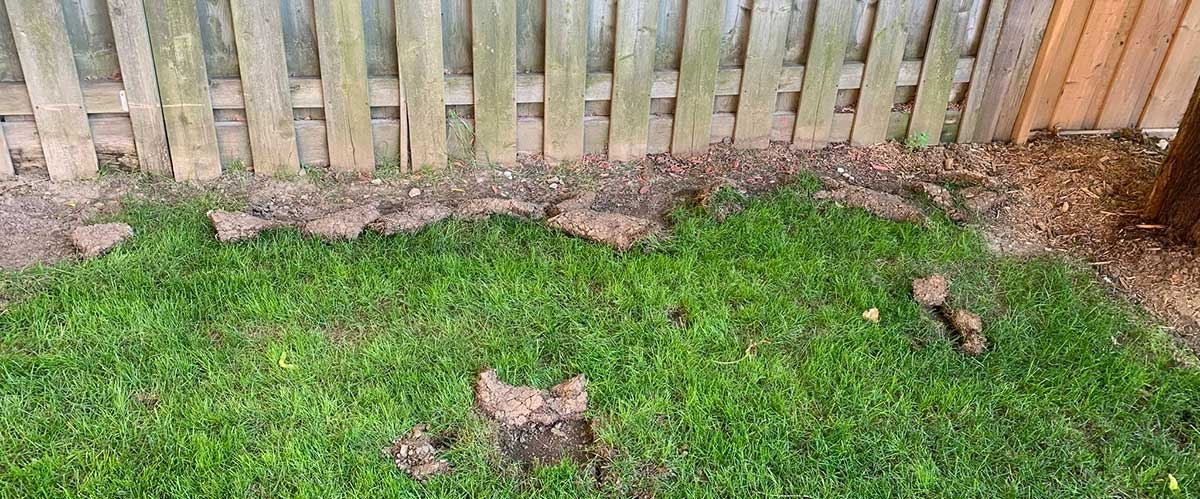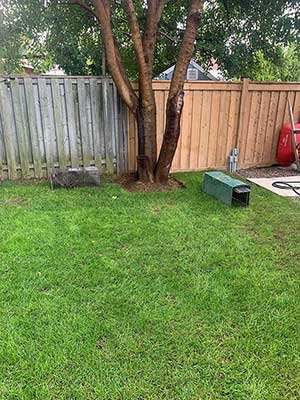The masked faces and ringed tails of raccoons are familiar creatures— but what exactly draws raccoons to your yard? And more importantly, how can you prevent them from destroying your property?
What Do Raccoons Need?

Food
Raccoons aren’t known to be picky eaters— the opposite, in fact. They’ll feast on just about anything they can get their paws on. From ripe fruits and veggies to juicy insects and small mammals, they have a varied diet. And what really gets their attention? Your garbage. Your overflowing trash bin is like a buffet invitation for these critters, and could be the reason why they’re returning to your yard night after night.
Water
Additionally, just like us, raccoons need to stay hydrated. They'll happily slurp from ponds, bird baths, or even a leaky outdoor faucet. If you've got standing water in your yard, you've basically set up a raccoon watering hole, which might not be ideal if you’re trying to keep these critters away.
Shelter
When the sun goes down, raccoons are on the lookout for a cozy place to crash. They'll nestle into dens, hollow trees, or even seek refuge under decks or in sheds. Your attic might seem like a secluded hideout to them too, so don't be surprised if you hear some unexpected guests scurrying around up there.
In addition to shelter, raccoons are also frequently on the hunt for building materials. Leaves, twigs, grass, and sometimes even bits of man-made stuff like insulation or paper make for prime nesting materials.
That’s why it’s important to keep your yard tidy to avoid inadvertently providing raccoons with the perfect construction site.
But aside from what attracts raccoons to your yard, let’s explore a little more about their behaviors.
Where Do Raccoons Live?
In the wild, raccoons typically make themselves at home in wooded areas close to water sources, like forests, marshes, or streams. But they won’t hesitate to find shelter in your attics, crawl spaces, and even abandoned buildings. Sometimes, raccoons are simply passing through. Storm drains, culverts, or the space under your deck might serve as temporary shelters.
Ultimately, what attracts raccoons to your yard is all about convenience and easy access to the three things we mentioned: food, water, and shelter.
What Attracts Raccoons to Your Yard?
Trash Cans, Bird Feeders, or Compost Piles
Those unsecured bins filled with tasty leftovers are irresistible to raccoons, so tighten those lids, invest in raccoon-proof containers, and keep your garbage secure.
Spilled birdseed or easily accessible feeders are also like an open invitation for raccoons, so to keep them at bay, try hanging your feeders more strategically, using counter weights or baffles and other techniques to prevent larger wildlife from access and to deter these sneaky snackers.
And while it might seem like a good idea to recycle your kitchen scraps, raccoons see your compost piles as an all-you-can-eat buffet. To deter them, consider using enclosed compost bins or turning your pile regularly to make it less inviting.
Decks, Attics, or Sheds to Stay Warm
When the chilly nights roll around, raccoons will look for a cozy place to crash — that's where your deck, attic, or shed comes in. They can and will tear through insulation or even set up camp under your deck.
To keep them out, try sealing off potential entry points and remove any debris or clutter from these areas.
Bodies of Water (Ponds, Birdbaths, or Leaking Outdoor Faucets)
Ponds, birdbaths, or even leaking outdoor faucets can attract raccoons looking for a drink or a dip. To deter them, repair any leaks and consider using motion-activated deterrents or covering ponds with netting. As far as your birdbaths go, empty them in the evening and refill in the morning to prevent raccoons from turning them into their personal watering holes.
What Attracts Raccoons to Your Yard?
You've spotted them sneaking around your trash cans, perhaps even heard their playful chatter late into the night. Here’s how to get rid of raccoons in yard, and keep them out.
Secure Your Trash
Start by locking down those trash cans, and investing in heavy-duty, animal-proof trash cans with secure lids, and clean up any spilled garbage or food scraps around your trash cans. Another way to prevent raccoons from being in your yard is by putting out trash bins on the morning of collection rather than the night before to reduce the chances of attracting raccoons during their nightly scavenging adventures.
Remove Food Sources
While we’re talking about food sources, consider the other food sources that might be in your yard attracting raccoons, like an outdoor pet’s dinner bowl, food residue left behind from your grill, or even fruits and vegetables growing in your harden.
Bring your pet’s food inside or clean it up promptly, clean your grill as soon as you’re finished, try harvesting your produce promptly, and remove fallen fruits from the ground to eliminate potential food sources for raccoons.
Install Motion-Activated Lights
Motion-activated lights can startle and deter raccoons from entering your yard, especially when they're most active at night. Consider installing them near potential entry points to your yard, such as around trash cans, sheds, or along fence lines. You may also be able to adjust the sensitivity of the lights to ensure they're triggered by raccoon activity but not by other wildlife or passing cars. Note, that this will only work for so long. Raccoons are smart and will determine that there is no actual threat.
Install Sprinklers
While raccoons might come and try to drink your sitting water, motion-activated sprinklers can be a great way to alleviate raccoons from your yard.
Strategically place sprinklers to cover areas where raccoons are likely to enter or frequent, such as near trash cans or vegetable gardens. And don't forget to set them to operate during the times when raccoons are most active, typically during the night.
Install Fences
A tall, smooth-surfaced fence can be an effective physical barrier that raccoons will struggle to scale. But if you find the raccoon is digging, you might need to use wire mesh fences, specifically ones that are at least 12 inches underground along the fence line. This creates an additional obstacle and helps deter raccoons from digging underneath. If you find they’re trying to climb over your face, you might need overhangs or electric wire to put a stop to that.
Use Legal Repellents in Canada
You may be able to use some legal, natural repellents to sway the raccoon away. Just make sure it’s legal to use in Canada, follow the manufacturer’s instructions, and apply it properly in your yard (ensuring you’re not putting pets, children, or other wildlife at risk.).
 Call Hawkeye for Safe and Efficient Raccoon Removal
Call Hawkeye for Safe and Efficient Raccoon Removal
Tried figuring out how to get rid of raccoons in yard but still stumped?
Sometimes, despite your best efforts, those raccoons still won’t budge— which is where the professionals come in. Hawkeye Animal Control offers professional wildlife removal services that get the job done safely and humanely. We can identify raccoon entry points, implement exclusion techniques, and safely remove raccoons from your yard.














